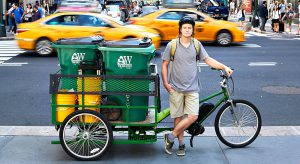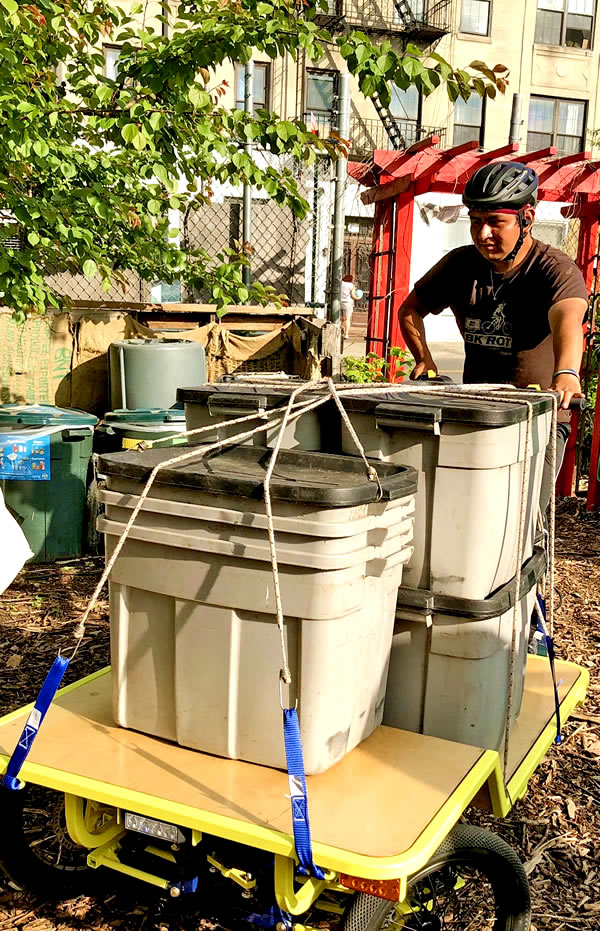New York City’s new Commercial Waste Zone Law has carve-out for small-scale organics collection.
Meredith Danberg-Ficarelli, Renée Peperone and Sandy Nurse

Photo courtesy of Reclaimed Organics
Microhauling can be broadly defined as the small-scale collection of materials by bikes, e-trikes (electric cargo tricycles), or low emission vehicles. In New York City (NYC), microhauling of organics serves smaller food waste generators that don’t have enough volume to warrant a conventional waste truck to service them. It is employed to collect organic material for local processing and devolumizing, consolidate for use in anaerobic digestion processes to produce energy, and/or be sent to larger composting facilities.
NYC’s microhaulers (about 5 at this time) collect food scraps during regular business hours, and to ensure success they educate their customers about waste reduction. These entities provide transparency (e.g., weight data reporting, which is not an industry standard) and accountability in private waste collection and processing between hauler and client — helping businesses understand the waste they generate and the associated financial, environmental, and social costs of landfilling or incinerating compostable material.

Photo courtesy of Common Ground Compost LLC
NYC’s waste system is bifurcated into separate residential and commercial operations. The City makes the rules for the whole system, and collects from households, while a network of approximately 90 traditional private hauling companies collect commercial waste from businesses. The current commercial collection system is inefficient, dangerous and unjust. Trucks criss cross each other every night on their collection routes leading to intense pressure on workers, unnecessary miles traveled, and excessive harmful emissions. Negative social and environmental impacts from routes and practices impact all New Yorkers, in particular the most vulnerable, since NYC’s waste infrastructure is concentrated in low income communities and communities of color in the South Bronx, North Brooklyn, and Southwest Queens.
Adoption Of Commercial Waste Zones
The New York City Department of Sanitation (DSNY), in collaboration with the City’s Business Integrity Commission (BIC), hired a consultant to develop plans for a new commercial waste system, referred to as the Commercial Waste Zones (CWZ) plan. Years of stakeholder engagement meetings and public hearings turned the plan into a bill that was signed into law in November 2019.

Photo courtesy of Reclaimed Organics
For 10 years, microhauling operations in NYC existed in a legal gray area. During this time microhaulers sought legitimacy and protections from the city through BIC licensing, and continued to define their unique work as an integral part of a tiered network of integrated waste collection services. Through grassroots efforts, microscale collection was written into law in 2019 as part of NYC’s overhaul of the commercial waste system.
The CWZ will restructure NYC’s entire waste system, bringing in the City as a regulatory agent to review bids from and eventually hold 10-year long contracts directly with “zoned” haulers. The haulers must present bids to the City that detail their services, pricing, environmental, labor and safety standards, and more in order to be considered for a zone or zones. There are plans to integrate an improved system of enforcement of new and existing rules, including recycling, to ensure compliance.
Increased enforcement of recycling rules will improve diversion by helping businesses better understand what they must do to comply with City regulations. The new system will allow businesses to access a free assessment of their waste stream from a third party auditor; data from that audit can be used to seek price estimates from haulers, identify opportunities for waste reduction, and improve transparency in what they are paying for.
All businesses will have access to organics collection, whether through the zoned haulers, subcontractors, or microhaulers. Microhaulers can collect up to a specific tonnage cap each year. For zero emissions microhaulers, the cap is 2,600 tons/year of organics; microhaulers using vehicles can collect up to 500 tons/year. They are exempt from the zoned system, up to the capped amount, and operate as separate third party vendors (not zoned haulers or subcontractors). If they surpass the cap, microhaulers are required to participate as haulers of a zone or subcontract to any haulers who won bids for zones. This hard-won exemption enables NYC microhaulers to maintain existing collection relationships, define their own unique business models, and scale up without being held to terms made for traditional hauling. Their collection practices must comply with existing New York State DEC Part 360-364 rules. Microhaulers endeavored to propose policy suggestions that build on already existing laws.
Processing Capacity
The ultimate goal is for small businesses to generate very little landfill waste, reducing the frequency of pick ups per week by the traditional “garbage” truck. NYC microhaulers continue to advocate for and aim to build more hyperlocal processing sites. For example, two microhaulers, BK ROT and Vokashi, are able to process all of the organics they collect locally. Another, Reclaimed Organics, utilizes a commercial facility to process its material. In general, access to consistently available organics processing space is a challenge to all organics haulers, no matter the scale. Improving diversion and the supply of organics collection services will hopefully increase demand for organics processing capacity close to NYC. Keeping organic matter near to where it is generated saves the emissions costs associated with transporting it, and provides local benefits of jobs and production of nutrient-dense compost that supports healthy food systems, sequesters carbon, and amends city soils.
NYC’s microhaulers are also working towards greater efficiency through collaborations with traditional haulers, and are demonstrating through partnerships that improvements can be made in a variety of areas including but not limited to: Route density; Uncontaminated organics; Recycling and waste education for businesses; Pricing transparency; Diversion linked to pricing with landfill being the most expensive stream to have collected; Environmental justice; Workers rights; Community impacts/benefits (noise, pollution, vehicle safety, etc); and Minority- and Women-Owned Business inclusion.
The City’s microhaulers have proven that micro-scale collection, processing, and consolidation can be a mechanism to further improve transparency and efficiency in a commercial waste system that is going to undergo significant changes in the years to come. By including microhauling in the CWZ, NYC has shown a tangible commitment to reshaping its waste system for a new era.
Meredith Danberg-Ficarelli is Director of Common Ground Compost LLC, which facilitates organics recycling in NYC. She sits on the Manhattan Solid Waste Advisory Board, is a member of the Institute for Local Self Reliance’s Community Composting Coalition, and was recognized by the New York State Association for Reuse, Reduction, and Recycling with the 2019 Recycling Leadership Award.
Renée Peperone worked for 7 years in operations leadership and organic waste advocacy through BK ROT, the first nonprofit youth employment organics microhauling and processing service in NYC. After stepping down as BK ROT’s Board Chair in June 2019, she co-founded Just Hauling, Inc. a social enterprise focused on building local emissions free solutions to organic waste hauling and processing.
Sandy Nurse is founder and former Executive Director of BK ROT, and co-founder of Just Hauling. BK ROT, along with the NYC Microhaulers, successfully advocated for the inclusion of microhauling in NYC’s Commercial Waste Zones bill. Now through Just Hauling, she is working to grow the critical infrastructure needed for microhauling in New York City to scale up.










